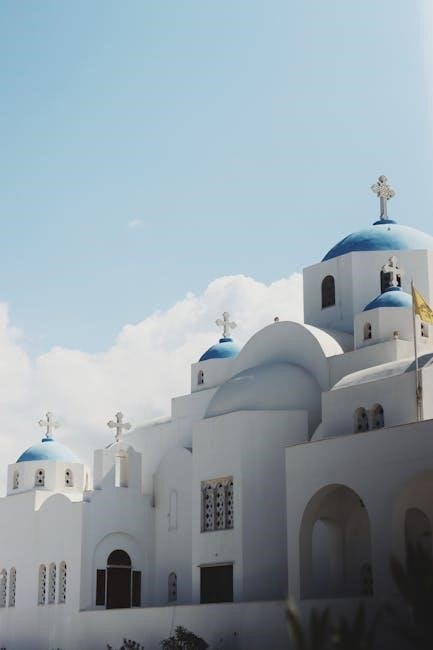The Ethiopian Orthodox fasting calendar is a sacred guide for believers, outlining periods of abstinence and spiritual reflection․ It includes over 180 fasting days annually, with major periods like Great Lent, Apostles’ Fast, Dormition, and Nativity․ Rooted in tradition, it emphasizes prayer, charity, and self-discipline, fostering deeper faith and communal unity․ The 2024 calendar offers precise dates, essential for adherents seeking to align their devotion with sacred timings․
1․1 Overview of the Ethiopian Orthodox Tewahedo Church
The Ethiopian Orthodox Tewahedo Church is one of the oldest Christian churches, with a rich tradition dating back to the 1st century AD․ It is the largest Christian denomination in Ethiopia, known for its unique liturgical practices and deep spiritual heritage․ The church plays a central role in the cultural and religious life of its followers, emphasizing monasticism, sacraments, and communal worship․ Its teachings are rooted in the Bible and the traditions of the early Church, making it a cornerstone of Ethiopian identity and faith․
1․2 Significance of Fasting in the Ethiopian Orthodox Tradition
Fasting holds profound spiritual and communal significance in the Ethiopian Orthodox tradition, serving as a means of purification, repentance, and drawing closer to God․ It is a practice rooted in biblical teachings and the example of Jesus Christ, who fasted for 40 days in the wilderness․ Fasting strengthens self-discipline, fosters empathy for the needy, and unites believers in shared devotion․ By abstaining from worldly comforts, adherents focus on prayer, reflection, and charity, enriching their spiritual lives and deepening their faith․
Structure of the Ethiopian Orthodox Calendar
The Ethiopian Orthodox calendar consists of 365 days, with an extra day added every four years․ Each year is named after one of the four Evangelists, reflecting its unique liturgical focus․
2․1 Differences Between the Ethiopian and Gregorian Calendars
The Ethiopian calendar differs from the Gregorian calendar in structure and dating․ It has 365 days with a leap year every four years, but its year begins in September․ The Ethiopian calendar includes 12 months of 30 days each and a 13th month, Pagumain, with 5 or 6 days․ It is approximately 7 to 8 years behind the Gregorian calendar due to historical discrepancies․ Additionally, the calculation of Easter differs, as the Ethiopian Orthodox Church follows the ancient Alexandrian method, often resulting in a later celebration date․
2․2 The 365-Day Year and Leap Year System
The Ethiopian calendar consists of 365 days, with an additional day added every four years, similar to the Gregorian leap year system․ Each year is dedicated to one of the four Evangelists—Matthew, Mark, Luke, or John—rotating every four years․ The calendar is divided into 12 months of 30 days each, plus a 13th month, Pagumain, with 5 or 6 days․ This structure ensures alignment with the solar year, maintaining accuracy for religious observances and fasting periods, while differing from the Gregorian calendar in its leap year application and overall organization․

Major Fasting Periods in 2024
Key fasting periods include Great Lent, Apostles’ Fast, Dormition Fast, and Nativity Fast, with the Ethiopian New Year on September 11, 2024․
3․1 Great Lent (Abye Tsome or Hudade)
Great Lent, or Abye Tsome, is the most rigorous fasting period, lasting 55 days․ It begins on February 11 and ends on April 6 in 2024․ This period prepares believers for Easter through intense prayer, reflection, and abstinence from meat and dairy․ Fasting is observed from dawn to sunset, with exceptions for the sick and elderly․ It includes a 7-day intensification before Easter, emphasizing spiritual purification and renewal․ This fast is a cornerstone of Ethiopian Orthodox devotion, fostering humility and a deeper connection to Christ’s journey․
3․2 The Apostles’ Fast

The Apostles’ Fast begins after the Descent of the Holy Spirit and lasts until the Feast of St․ Peter and St․ Paul on June 29, 2024․ It varies in duration, typically spanning 10 to 30 days, depending on the date of Easter․ This fast honors the apostles’ devotion and missionary work․ Believers abstain from meat and dairy, engaging in prayer and charity․ It is a period of spiritual growth, reflecting on the apostles’ sacrifices and their role in spreading Christianity, while preparing for the feast that commemorates their martyrdom and legacy․
3․3 The Dormition Fast
The Dormition Fast, also known as Tsome Filseta, occurs in August 2024, lasting 15 days until the Feast of the Assumption of the Virgin Mary on August 22․ This fast honors the Mother of God’s life and her role in salvation history․ Believers abstain from meat and dairy, dedicating time to prayer and reflection․ The fast strengthens spiritual discipline and prepares the faithful for the joyous celebration of Mary’s dormition, emphasizing her intercession and the hope of eternal life․ It is a period of renewal and deepening devotion to the Holy Virgin․
3․4 The Nativity Fast
The Nativity Fast, observed from November 25 to January 6, 2024, is a 40-day period preparing for the birth of Jesus Christ․ It emphasizes prayer, simplicity, and charity, mirroring the wilderness experience of Mary and Joseph․ Believers abstain from meat, dairy, and luxurious foods, focusing on spiritual renewal․ This fast culminates in the celebration of Ganna (Ethiopian Christmas) on January 7, 2024, marking the divine incarnation and the gift of salvation․ It is a time of joyful anticipation and deepening connection to the mystery of Christ’s birth․

Spiritual Practices During Fasting
Fasting in the Ethiopian Orthodox tradition involves intense prayer, reflection, and acts of charity, fostering a deeper connection to God and community․ It emphasizes spiritual renewal and humility․
4․1 Prayer and Reflection
Prayer and reflection are central to Ethiopian Orthodox fasting, fostering spiritual growth and intimacy with God․ Believers engage in heartfelt supplications, often reciting Psalms and hymns, emphasizing humility and repentance․ Reflection involves contemplating life, acknowledging sins, and seeking divine mercy․ The teachings of St․ Yared-Digua inspire believers to guard their senses from evil, ensuring their fast is pure and meaningful․ This practice strengthens faith, deepens devotion, and prepares the spirit for the feast following the fast, renewing the soul and drawing closer to God․
4․2 Abstinence from Food and Drink
Abstinence from food and drink is a cornerstone of Ethiopian Orthodox fasting, emphasizing self-control and devotion․ Fasting periods typically exclude meat, dairy, and eggs, adhering to a vegan diet․ The strictest fasts, like Holy Friday, may involve complete abstinence from food and water․ This practice, rooted in biblical teachings, aims to purify the body and soul, fostering humility and spiritual focus․ By refraining from worldly indulgences, believers draw closer to God, embodying the essence of sacrifice and renewal central to their faith․
4․3 Almsgiving and Acts of Charity
Almsgiving and acts of charity are integral to Ethiopian Orthodox fasting, emphasizing compassion and service to others․ Believers are encouraged to give generously to the poor and needy, reflecting the teachings of Christ․ Fasting is not merely abstinence but also a call to share blessings and support the vulnerable․ This practice strengthens communal bonds and deepens spiritual growth, fostering a sense of responsibility and love within the faith community․ Charity, alongside prayer and fasting, completes the triad of righteous living in the Ethiopian Orthodox tradition․

The Role of the Ethiopian Orthodox Fasting Calendar PDF
The Ethiopian Orthodox fasting calendar PDF serves as a vital resource, providing accurate fasting dates, spiritual guidance, and accessibility for believers to stay aligned with their faith traditions․
5․1 Importance of Accurate Dating
Accurate dating is crucial for adhering to the Ethiopian Orthodox fasting calendar, ensuring followers observe the correct periods of abstinence and spiritual reflection․ The calendar differs from the Gregorian system, with a 365-day year and a leap year every four years, making precise dating essential for religious practices․ Consulting a reliable 2024 PDF calendar helps believers align their devotion with sacred timings, fostering a deeper connection to their faith and communal traditions․ This ensures spiritual observances are honored correctly and meaningfully throughout the year․
5․2 Digital Resources and Apps
Digital resources and apps have become invaluable tools for tracking the Ethiopian Orthodox fasting calendar․ Apps like Tewahdo provide detailed fasting schedules, prayer books, and holiday reminders, making it easier for believers to stay informed․ These platforms offer accessible and convenient ways to observe fasting periods, ensuring adherence to religious practices․ By leveraging technology, followers can seamlessly integrate spiritual obligations into their daily lives, enhancing their devotion and connection to the faith․ Such resources are particularly helpful for those seeking to deepen their spiritual journey in a modern world․
Community and Fasting
Community plays a vital role in Ethiopian Orthodox fasting, fostering unity and mutual support among believers․ Shared practices strengthen bonds and deepen collective spiritual growth․
6․1 Communal Worship and Support
Communal worship is central to Ethiopian Orthodox fasting, fostering unity and strength among believers․ Congregants gather for prolonged prayer services, known as Mahelet, and share meals post-fast․ Churches organize communal prayers and teachings, enhancing spiritual focus․ The community offers mutual support, encouraging adherence to fasting rules and providing meals for the needy․ This collective approach strengthens faith and fosters a sense of belonging, reflecting the church’s emphasis on shared spiritual journeys․ Digital resources like the Tewahdo app further unite the community, providing prayer books and fasting schedules․
6․2 Strengthening Faith Through Shared Practices
Shared fasting practices deepen believers’ connection to their faith and foster spiritual growth․ The collective observance of fasting periods creates a sense of unity and accountability․ Through communal prayers, almsgiving, and reflection, adherents strengthen their commitment to the Ethiopian Orthodox tradition․ Shared meals after fasting, known as bircha, further reinforce bonds within the community․ These practices, guided by the 2024 fasting calendar, inspire believers to embody the teachings of the Church, fostering a deeper understanding of their faith and its cultural significance․
The Ethiopian Orthodox fasting calendar remains a cornerstone of spiritual life, guiding believers in their devotion and fostering a deeper connection to their faith and community․
7․1 The Enduring Significance of Fasting in the Ethiopian Orthodox Church
Fasting holds a profound place in the Ethiopian Orthodox Church, serving as a cornerstone of spiritual growth and devotion․ It fosters self-reflection, humility, and a deeper connection to faith․ By observing these sacred periods, believers emulate Christ’s example and strengthen their commitment to a holistic life of prayer, charity, and moral integrity․ The 2024 fasting calendar ensures this timeless tradition continues, guiding followers through periods of abstinence and communal worship, thus preserving the church’s rich spiritual heritage for future generations․